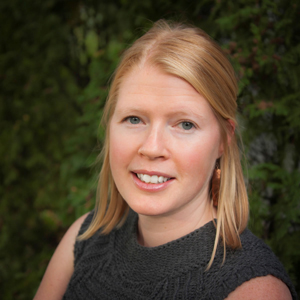In the Direction of the Unforeseen: PJ Grace in Conversation with Lisa Martin-DeMoor

Social Media, Marketing & Circulation Manager PJ Grace talks with Lisa Martin-DeMoor on life after winning the 2013 Open Season Award for Poetry for her poem, "Believing is Not the Same as Being Saved."
One year after winning The Malahat Review’s 2013 Open Season Award for Poetry, in what direction has your life taken you?
In the direction of the unforeseen. I'm back to teaching literature to university students for the first time since 2007. My daughter has just started kindergarten, and my two-year-old son is busy discovering that words can be combined into declarations (also interrogations and exclamations) about himself and many other things. How to Expect What You're Not Expecting: Stories of Pregnancy, Parenthood, and Loss (the anthology I co-edited with Jessica Hiemstra) has just been released by Touchwood Editions. I'm working on a novel that deals with some of the same material (thematically) as “Believing is not the same as Being Saved,” the poem that won the Open Season Award. I'm blogging less frequently (at www.writerinresidence.ca). I'm still figuring out life as a person who is a mother and a writer—while standing, as we all do, on shifting ground.
Can wisdom be gained from one’s own poetry? Do you ever come back to your poems long after you’ve written them and glean something new from them?
The wisdom in one's own poetry often catches one by surprise later on. We are all, always, forgetting what we know. Our poems are one of the ways our own wisdom comes back to us. I do return to my own poems from time to time, and am sometimes surprised by them. Perhaps I disagree with myself, or am amazed by the way what I knew in the past can speak now to a then-unforeseeable future.
Recently, I read someone (though I'm afraid I can't remember who it was) who claimed that good art is multi-contextual and this is why it speaks to each of us privately, and in different ways at different life moments. This seems true to me of the work I return to, the work I love best. But it's different when this happens with one's own work. There's something uncanny about it when the voice is one's own, the words are one's own, but the meaning has changed.
Do you enter writing contests often? How do they make a difference if you’re an established or budding writer?
I enter contests mostly when I want to renew a subscription to a journal I like to read, or if a contest seems like an especially good fit with work I have ready to send out. To win a contest like The Malahat Review's Open Season Award is a great corroboration. A reassurance that one's work can be part of an actual conversation.
As a writer of fiction and non-fiction, what intrigues you about the poetic form? Why do you come back to it?
Poetry is the first genre I fell in love with (past childhood). I keep coming back to it because it is still my most basic impulse under any real pressure. But increasingly fiction and non-fiction are the genres required for me to do the work that's pressing. Not the work required under extraordinary circumstances (that's still poetry for me), but the ordinary, day-to-day work: the prosaic work. I think what I do in fiction and non-fiction has its roots in the same impulse that turns me toward poetry. It's a kind of formal renovation of the basic, originating impulse.
Your winning poem deals with youth and loss, two themes that cross over into the collection How to Expect What You’re Not Expecting, recently published by TouchWood Editions. What was it like being an editor for this anthology?
Putting together How to Expect What You're Not Expecting has been transformational for me. I feel like in the process of working on this book I've crossed into the ethical terrain of mid-life. I've learned so much about the possibilities of community, about sticking to a vision through seeming impossibility and coming out the other side with the vision deepened, about collaboration and friendship, about loss and the profound and manifold ways it changes us, about the importance of good art. The early days of trying to put this book together were a bit baffling: how does one find the work one wants? The answer has to do with luck, perseverance, the generosity of others, and hard work—as well as with learning how to open up and hold open a particular kind of space, and being clear and stubborn about intention.
I loved editing these essays. Jessica Hiemstra (my co-editor) and I believe in the essays in this book so deeply: they are intelligent, brave, insightful, generous, and perhaps most importantly they are profoundly unlike one another. Together, they are a potent medicine for those of us who have sustained losses related to pregnancy, parenthood, and/or their possibilities. Medicine, too, for a culture averse to loss, a culture still so publicly silent about the kinds of loss this book touches.
I understand you’re at work on a novel, as well as a second manuscript of poetry. Any details you can share with us on your progress so far?
The novel is my main writerly occupation at the moment. The manuscript of poetry will be called The Book of Opposites, and is slowly accumulating a critical mass.

PJ Grace
* * * * * * * *
Read more about Lisa Martin-DeMoor's winning poem here.









